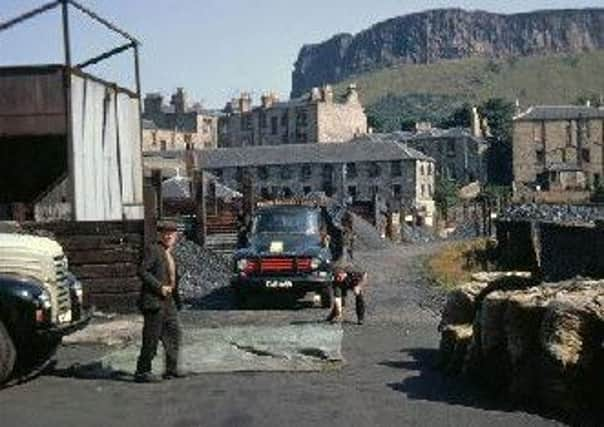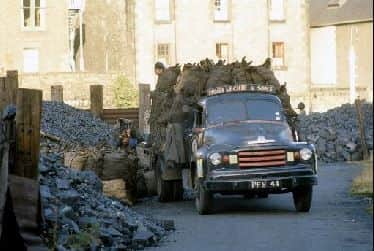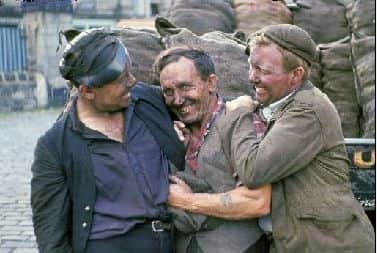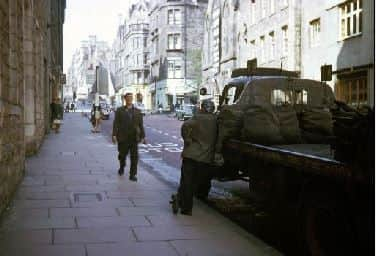Memories of Leckie & Sons: the Edinburgh coal merchants


Based at the large central depot of St Leonard’s, many belonged to Leckie’s, one of the better-known coal merchants in Edinburgh. The depot was located at the terminus of the former Edinburgh and Dalkeith line – referred to as the Innocent Railway – which had linked the rich coal seams of Midlothian with Scotland’s capital city since the 1830s.
For the Leckies, it all began in 1907 when Hugh Snr, then 19 years old, signed a contract with J Alexander Halkett to sell coal in Edinburgh.
Advertisement
Hide AdAdvertisement
Hide AdDuring the First World War, Hugh was designated as a gunner in the 36th Reserve Battery, remaining in Scotland as a coal porter. “He stayed to keep the fires burning,” says Ron Leckie, Hugh’s grandson.


Soon after the war ended, Hugh set up his own coal business, trading up until April 1933 as H & J Leckie, and then Hugh Leckie & Sons when his two eldest boys, Willie and Jimmy, reached adulthood. In 1949, Hugh’s other two sons, Hugh Jnr and John, joined the firm, making it five full partners in total. The secretarial side of the business was handled by Hugh Snr’s daughter, Jenny Bonnar, at the depot office.
Ron explains: “My father [Hugh Jnr] and his brother joined the firm after returning from service during the Second World War. Hugh Jnr was in the Seaforth Highlanders, and fought on the beaches at Normandy – something he didn’t talk about”.
The family was a tight unit, grafting hard to earn a formidable reputation across Edinburgh, and a living. Their loyal customer base took in much of the surrounding areas, such as Newington and Dumbiedykes, but was not confined to any given district. “It was all about loyalty,” says Ron. “Not so much a district as a reputation – we delivered to the entire city.”
Advertisement
Hide AdAdvertisement
Hide AdAs the business grew, the family invested in Leckie’s branded coal lorries in order to extend their delivery range. The fleet consisted of around eight vehicles, all coloured black with red trim, and each lorry door was emblazoned with a hand-painted fireplace set below lettering which read: “You’ll be ‘Gratefull’ with our service”.


One young man who wasn’t feeling particularly “gratefull”, however, was 16-year-old Ron on his first proper day at the job.
“The last bag of the day was on St Mary’s Street and the guys I was working with had told me the final delivery would be the ‘easiest’,” he recalls.
“As it turned out the house was five floors up and the bags weighed 112lbs. But that’s what happens when you’re the boss’s son!”


Advertisement
Hide AdAdvertisement
Hide AdOne of Ron’s other family recollections isn’t one to smile about: “Hugh Snr left the depot one winter’s evening in 1952 when he was mugged by three guys. They beat him up really badly and snatched the days takings – some £300, a fortune back then.” Hugh was 65 years of age at the time of the attack.
“Another incident, which is probably the most famous, was when one of our lorries came careering down Arthur Street in the Dumbiedykes – one of the city’s steepest streets – crashing into Holyrood Park. A local photographer was there to snap the incident and a few of the kids slinked off that day with dirty hands!”
The coal business could be lucrative but it wasn’t for the workshy or idle, says Ron: “The family worked from 7 in the morning till around 5.30pm, then after that it was a trip to Bill’s Bar at the corner of Montague Street to wash down the dust with a couple of pints before heading home for tea.


“As you can imagine, December was especially busy – and tough. In winter the frost got so bad that the jute bags would retain their filled shape and we had to stomp on them to flatten them for storage.
Advertisement
Hide AdAdvertisement
Hide Ad“It was just half a day on Christmas Day, though, then a two-day holiday after New Year’s.”
When Hugh Snr passed away in April 1958, the brothers inherited the business. Later, following the closure of the Innocent Railway in 1968, the business began to ramp down, with coal trucked into the yard from then on.
At a national level, the times were changing. The Clean Air Acts of 1956
and 1968 signalled the death knell for
the coal industry in Britain. Sightings of the coal man, a once ubiquitous presence on our city streets, became less and less common as the years progressed. By 1971, Hugh Leckie & Sons’ remaining family members, fed up with the gruelling daily grind, had ceased trading in coal altogether. A hugely successful family-run business which spanned five decades and three generations had finally been brought to a close.


Advertisement
Hide AdAdvertisement
Hide AdRon Leckie worked in the coal business on weekends and holidays from school and university.
He chose a different path from his father and uncles, earning himself a degree in electronics from Heriot Watt University, and in 1976 he crossed the Atlantic to settle in a little-known place in northern California nicknamed Silicon Valley.
He has remained happily there ever since.
